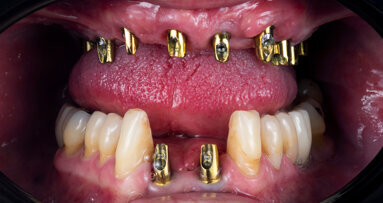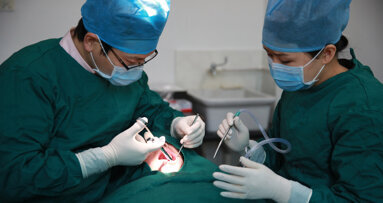TAIYUAN, China: Over the last couple of weeks, details have begun emerging of an investigation into a disturbing and highly profitable trade in dead body parts for use in the production of allogenic dental bone grafts in the northern Chinese province of Shanxi. The case was initially brought to light by a local criminal lawyer, who alleged in a social media post that a local company was under investigation for having illegally acquired over 4,000 bodies from crematoriums and medical laboratories across the region for use within the dental industry.
According to the South China Morning Post, local authorities have since confirmed that an investigation into the issue is ongoing, thereby lending credence to the initial claims. While the criminal case must be left to run its proper course, the allegations name local company Shanxi Aorui Biomaterials as operating at the centre of an extensive network supplying dead body parts and employing the bone to produce allogenic bone grafts. It has also been said that the company had profited from the trade to the extent of 380 million yuan (€48.23 million)* between January 2015 and July 2023. Another staggering detail is that, according to the lawyer, local police had seized over 18 tonnes of bones and more than 34,000 semi-finished and finished products.
The fallout from the accusations and the enormous media attention generated has been significant. According to reports by Radio Free Asia, the lawyer who initially made the allegations has been removed from his position as director at his law firm, and internet searches into the case have been increasingly subjected to censorship within China since the story broke.
Aside from its obviously macabre elements, the unfolding Chinese case draws our attention to the hidden and unethical manner in which dental materials have sometimes been acquired, even by reputable medical institutions. Cultural tendencies to manage death in a highly closed environment, coupled with a highly profitable marketplace, provide an opening that opportunistic groups with no scruples may exploit. Such instances are, of course, not limited to China. A recent article from Boston radio station WBUR, for example, exposed how an employee of Harvard Medical School was similarly implicated in illegally selling parts from bodies donated to science. The extent to which the global dental industry is involved in these iniquitous acts requires greater investigation, but the Chinese case should be taken as a cautionary tale.
Editorial note:
* Calculated on the OANDA platform for 31 July 2023.
Topics:
Tags:
HONG KONG: Facing some of the highest private healthcare costs in the world, due to high labour costs, limited public dental services and restricted ...
BioHorizons Camlog, a diamond partner of the 2023 EAO–DGI joint meeting, is presenting its comprehensive portfolio of various implant systems and ...
BEIJING, China: The Chinese government introduced a volume-based procurement (VBP) policy in November 2018 in the pharmaceutical industry, and this was ...
LEIPZIG, Germany: Strong patient volumes in most countries, coupled with a dramatic uptick in China, helped major dental manufacturers to post sales growth ...
CHENGDU, China: Bulk procurement of dental implants in China will halve the cost of implant treatment, according to the country’s National Healthcare ...
Live webinar
Tue. 24 February 2026
1:00 pm EST (New York)
Prof. Dr. Markus B. Hürzeler
Live webinar
Tue. 24 February 2026
3:00 pm EST (New York)
Prof. Dr. Marcel A. Wainwright DDS, PhD
Live webinar
Wed. 25 February 2026
11:00 am EST (New York)
Prof. Dr. Daniel Edelhoff
Live webinar
Wed. 25 February 2026
1:00 pm EST (New York)
Live webinar
Wed. 25 February 2026
8:00 pm EST (New York)
Live webinar
Tue. 3 March 2026
11:00 am EST (New York)
Dr. Omar Lugo Cirujano Maxilofacial
Live webinar
Tue. 3 March 2026
8:00 pm EST (New York)
Dr. Vasiliki Maseli DDS, MS, EdM



 Austria / Österreich
Austria / Österreich
 Bosnia and Herzegovina / Босна и Херцеговина
Bosnia and Herzegovina / Босна и Херцеговина
 Bulgaria / България
Bulgaria / България
 Croatia / Hrvatska
Croatia / Hrvatska
 Czech Republic & Slovakia / Česká republika & Slovensko
Czech Republic & Slovakia / Česká republika & Slovensko
 France / France
France / France
 Germany / Deutschland
Germany / Deutschland
 Greece / ΕΛΛΑΔΑ
Greece / ΕΛΛΑΔΑ
 Hungary / Hungary
Hungary / Hungary
 Italy / Italia
Italy / Italia
 Netherlands / Nederland
Netherlands / Nederland
 Nordic / Nordic
Nordic / Nordic
 Poland / Polska
Poland / Polska
 Portugal / Portugal
Portugal / Portugal
 Romania & Moldova / România & Moldova
Romania & Moldova / România & Moldova
 Slovenia / Slovenija
Slovenia / Slovenija
 Serbia & Montenegro / Србија и Црна Гора
Serbia & Montenegro / Србија и Црна Гора
 Spain / España
Spain / España
 Switzerland / Schweiz
Switzerland / Schweiz
 Turkey / Türkiye
Turkey / Türkiye
 UK & Ireland / UK & Ireland
UK & Ireland / UK & Ireland
 International / International
International / International
 Brazil / Brasil
Brazil / Brasil
 Canada / Canada
Canada / Canada
 Latin America / Latinoamérica
Latin America / Latinoamérica
 USA / USA
USA / USA
 China / 中国
China / 中国
 India / भारत गणराज्य
India / भारत गणराज्य
 Pakistan / Pākistān
Pakistan / Pākistān
 Vietnam / Việt Nam
Vietnam / Việt Nam
 Israel / מְדִינַת יִשְׂרָאֵל
Israel / מְדִינַת יִשְׂרָאֵל
 Algeria, Morocco & Tunisia / الجزائر والمغرب وتونس
Algeria, Morocco & Tunisia / الجزائر والمغرب وتونس
 Middle East / Middle East
Middle East / Middle East




















































To post a reply please login or register